Unite the Union officers come together with USW colleagues for paper exchange trip
A number of Unite the Union officers have spent two weeks with USW colleagues as part of an exchange trip involving the two unions. In May 2010, the three officers spent a week observing and taking part in negotiations throughout the US before USW colleagues came to the UK in November 2010.
- Sally Feistel - Politics in the UK
- Brian Harder
- Ron Espinoza
- Alison Jones in Southern California
- Tim Elliot in Wisconsin
- Louisa Bull in British Columbia
Sally Feistel
Friday 19 November 2010
Kent, The Garden of England
We started our journey somewhere near what is referred to by some as the garden of England. We arrived at a company who requested to remain anonymous due to the sensitivity of the discussions and the outcome on potential customers. The Company is going through some rough times and requested that the chapel give some relief with regards to terms and conditions. Times are difficult in England; which we know only to well in the US also. The company hoping to remain viable, was upfront in their need for concessions, and listened intently as Regional Officer Elliott and FOC (to remain unnamed) explained the chapels position. Due to the national agreement, many of the proposed concessions were dismissed by the union.
With that said, after a candid and respectful dialog we did come to terms with an offer we were able to recommend to the chapel. As both parties were somewhat relieved, a vote to accept is scheduled for next week.
As the week came to a bitter end, Tim and I reflected on the experiences we shared participating in the Workers Uniting exchange. We both agreed that the experience has been extremely beneficial and an important step in continuing to help workers throughout the world; with hopes to engage the next generation of activists. I am extremely honoured and blessed to have participated in such a powerful experience. To all my new friends, thank you for welcoming me into your chapels.
Thursday 18 November 2010
Thursday morning started with a meeting between Antalis and Unite to discuss a proposal from Arjo Wiggins Teape to change the provider of their warehousing and logistics work from CEVA (workers current employer) to Antalis McNaughton. The reason stated for doing so is because Antalis currently has a more commercially viable hub to provide warehousing. The meeting was held to discuss the terms and conditions of the redundancy or severance package as is similar in the US. It was interesting to learn that not all union members had the same "contract of employment" which made the negotiations much more unique.
As many USW and Unite members know of someone, maybe themselves, a family member and/or friend who have lost their jobs through no fault of their own; these discussions are never easy. I felt for the brothers and sisters who are about to lose their jobs. However with that said, and although the negotiations are not yet completed I am confident that these workers will be taken care of as best as we possibly could have. We discussed redundancy payments, a relocation package, training incentive, and a performance element or loyalty payment for those who continue to work until the final shutdown date of April 2011.
Kimberly-Clark Northfleet was next on our agenda. I became reacquainted with FOC Barry Atkins whom I had the pleasure to meet once prior. I was also introduced to several of his committee members. We discussed their latest contract negotiations, pensions, hours of work, heath and safety, the global KC Agreement, amongst many other topics. We then visited with the plant manager to discuss heath and safety. Although historically the Northfleet mill has had an impeccable safety record, as of late this has not been the case. Coming from District 2 of the USW and our focus on safety with the "Kevin Wilson Initiative" which is designed not only as a focus on safety training, but to never forget our fallen, it was a pleasure to see the company and union working together to turn this trend around. I explained to the group the USW's hazard mapping which they were very interested in. This only goes to show how Workers Uniting can work together on common issues facing us all.
CPI Paper meeting
Wednesday 17 November 2010
Tim Elliot and I met up with FOC John from Arjo Wiggins at the train station with our destination London for the Confederation of Paper Industries (CPI) meeting with the FOCs from various paper companies. The CPI on behalf of member companies in the paper industry jointly developed a partnership agreement with Unite on behalf of all employees. The partnership was designed with the intent of a spirit of cooperation based on mutual respect and trust. Otherwise known as the ‘national agreement’, it has been developed to set minimum standards across the industry. The partners are committed to supporting successful companies in setting higher standards in the workplace. There is also a clause for those who are not profitable to seek relief.
National Officer Peter Ellis and senior workplace representative Gary chaired the meeting which was held to get feedback from the various reps regarding the upcoming pay talks for the CPI national agreement. Candid discussion took place with the various paper industry, with all giving an update on their respective companies. It is to be noted that several discussed serious workplace injuries not unlike what we face in the US. Most delegates stated that their company expects to be profitable this year. Of those in attendance the paper products represented include newsprint, tracing paper, tea bags and coffee filters, luxury packaging, paper for the medical industry, and electrical press paper just to name a few.
It is interesting to note the importance of Workers Uniting as I learned that one of these paper companies export 80% of their paper to the US. The rep informed us that his company is planning to move the operation to Ohio, USA and expect production to cease in the UK August 2012. National Officer Ellis informed the delegates of the recent offer negotiated with Kimberly-Clark which is not a partner of the CPI. He also discussed the recent paper talks and the industrial action balloting that will take place in January 2011.
The meeting overall was excellent, a great learning experience, and quite possibly an organizing target has been found.
ST Ives Westerham Press
Tuesday 16 November 2010
Today my journey started with approximately an hour and one half drive through the lovely countryside. The narrow roads we travelled through the most beautiful quaint villages. The scenery was breathtaking. We reached ST Ives Westerham Press where we met first with Father of the Chapel's Duncan and Nick to discuss the Company’s proposal to change the chapels terms and conditions.
I learned that St Ives does not take part in the ‘national agreement’ which is a working agreement between companies, their employees, and the union representatives. Commended by the government, this agreement is designed to offer the print industry a potential competitive advantage to other European printing industries.
The economic struggles in the UK are similar to those in the US. As company representative Peter Hayden, Managing Director stated extreme pricing pressures as the reason needed for the proposed changes. Ironically, there proposed solutions are similar in nature to the trend we also face within the US; that being greater flexibility as a key agenda item. The company also proposed a Bradford point score which is not unlike what we currently call point systems for attendance in the States. However, the one main difference is that the Bradford Points System is designed to reduce sick pay whereas in the US points systems are a tool to discipline or sack employees for absenteeism issues.
Monday 15 November 2010
On Monday we had a personal tour of the Palace of Westminster, the home of the United Kingdom Parliament. Parliament consists of the House of Lords, House of Commons, and the Queen. We learned that the House of Commons has over 600 democratically elected Members of Parliament (MPs) who meet to debate and make laws. We learned the House of Lords are not democratically elected; rather they are experts in various fields of study. The House of Lords plays an important role in revising and initiating legislation. Once there is agreement in both houses and the Queen gives her ok, the bill becomes law. Although it was noted that the Queen's Royal blessing is largely symbolic.
Currently Parliament is reviewing the number of MPs and the process by which the House of the Lords are chosen. Some believe the system to be flawed and wish to have the House of the Lords elected by the people.
After our tour we met with Jim Fitzpatrick a Member of Parliament over a nice English coffee. As we discussed our various governments it became clear to me there are definitely places in the world where unions play a more political role than currently in the United States. The differences between the US, UK, and Canada were discussed. We concluded our time together in London over a nice lunch, after which we began our journey to various areas of the UK. Tim and I took a Bob McNab (cockney rhyming slang for taxi) over cobblestone frog and toads (road) to the train which brought me to Kent where my journey continues.
Sunday 14 November 2010
Officially day one of my Unite exchange was spent with my host Tim Elliott taking me on a wonderful tour of London. The rain did not dampen our spirits as we enjoyed each others company, our walk around London and tour of the Tower Bridge. Late afternoon we met up with our peers from the USW and Unite (Brian, Vivian, Ron, Allison, Louisa, Tony). We immediately formed a bond typically of the union family.
Brian Harder
Friday 19 November 2010
Today we started out by touring the Marx Memorial Library. It is situated in the historic Clerkenwell Green area of London which is the location where most union protest walks begin. The extensive library exists “for the advancement of education, learning and knowledge… for all persons desiring to make bona fide use” It was interesting to see where both Carl Marx and Lenin worked in writing and printing in the early 1900s. The museum also holds several collections including among them an extensive labor union photography collection, the Print Unions Collection and International Brigade Archive, which keeps alive the memory of volunteers who traveled to Spain to defend democracy in 1936 to 1939. Over all I would recommend a visit to all trade unionists to learn a bit about our history and some of the base reasons of why we do what we do.
Next it was off to travel through London and down to Fleet Street where the Printer’s union began. In the 70’s and 80’s before Margret Thatcher came to power, everyone who worked on the street was Union. Then the Wopping struggle happened, where Murdock put 5,500 union members on the street when he locked them out and with Thatcher’s help allowed scabs into the work place she and the Conservative government of the day ended the union closed shop. During this period of time the national unions funds were frozen by the Tory government and the individual Chapels (local unions) withdrew all of their money in cash before the government could seize it. They kept the money at ‘The London Silver Vaults” in safety deposit boxes, each week Chapels would go and withdraw cash out to provide support to the workers who were locked out. As we went to Fleet Street we passed my work sites were many Unite members work, sites like the head office for the Bank of Scotland and Halsbury House where they produce legal books. The Thatcher government removed many rights from working people and the unions during their time in government. Just another reason why unions need to be directly involved in politics regardless of what country you are in.
When the Labour Party was in power they restored some of those rights, individuals can now be represented by a union in their work place even though the union may not have recognition in that particular work site. When an individual becomes a member of the Union the union is then allowed by law to represent the individual in all of their legal rights at the work site including, if an individual is injured at work the union can help the person to sue their employer for “pain and suffering” unlike in Canada where the employers have the Workers Compensation Board. When the union is able to show they have more than 50 % of the workers, they then can apply for union recognition and when successful they then have the right to bargain wage and working conditions into a collective agreement for all the employees at the work site. Often companies will agree to a voluntary recognition with the unions prior to them having to legally apply. The process for representation is completely different from Canada’s process for unions to represent workers. In the UK when an individual join the union they voluntarily begin paying union dues immediately and the union can represent them immediately on their individual rights unlike in Canada where recognition certification is required first.
During my week in London I found visiting the various sites and meeting the different National Officers and staff from Unite very informative and educational. I came away with many things to consider and I find it hard at this point to determine if I think as a whole the British system or the Canadian system is the better for representing workers, both have some advantages and disadvantages. I certainly came away with some ideas that I will be able to use in my own life representing workers and I confirmed that workers around the world face similar issues at work, like seeking a safe work site, dignity and respect and job security along with receiving their fair share of the pie.
Thursday 18 November 2010
Today organizing was on the agenda, I took the Tube (Subway) to the Woodberry Unite Office and there I met up with Mathew a national organizer. We left in the car for Norfolk to meet with a group of Unite members who work at Del Monte foods, a food processing plant that employs approximately 200 workers. On the way we stopped and picked up Andrea who is also on the national organizing team. The workers are made up with many different groups of people from different eastern European countries along with a large group of Brits. They met with some of the workers before and after their shift started, along with leafleting and talking to potential members at the plant gate. Like in Canada, soon as we showed up at the gate the manager was out of his office trying to tell us where we could stand. The organizers were working on getting more than 50 % of the workers signed up to join the union. Then they can apply for recognition and bargain a first collective agreement. One of the differences in England is that they can not even bargain a closed shop. When a person joins the union they immediately start to voluntarily pay monthly union dues even though they may not have a collective agreement. During the time prior to a collective agreement being reached the union will represent any member with any work related issue that the law affords the worker. It was a very interesting day and I learnt some new ideas regarding organizing from both Mathew and Andrea on the long drive that I will utilize upon my return to Canada.
Wednesday 17 November 2010
Today I joined Sally and Tim at the CPI National Bargaining Prep meeting. This meeting was similar to a wage and contract meeting back in British Columbia. The FOCs started with site reports including if their companies were expecting to make a profit in the coming year, to my surprise about 80% of the sites reported their management forecasting a profit in the coming year. The group shared their experiences at their sites and the feeling of their membership. National Officer Peter Ellis and senior workplace representative Gary chaired an excellent meeting and I came away with a better understanding of how National Bargaining worked in England, it was similar to how the forest industry in British Columbia bargained ten years ago before the break up of the main employer groups.
Next I went off to the Woodberry office of Unite where I met Louisa and Mike another National Officer from the graphics sector of Unite. We had a great discussion on many topics including organizing, membership education along with the importance of unions being directly involved in politics. Next we were all off to see a movie, “Made in Dagenham” it was about a group of women who went on strike against the Ford motor company in the 60’s for equal pay for equal work for women. It was a great movie and I would recommend to all trade unionists. I felt it reflected a great moment in history. As we were leaving we ran into a couple more Unite representatives who had seen the movie and we immediately got into great discussion regarding unions and the importance of politics and the whole Workers Uniting program. We all came away agreeing that both topics were important for the future our Unions.
Tuesday 16 November 2010
Today we were off to OCE UK and met with Paul the workplace representative, Father of the Chapel which is equivalent to the Unit President in the USW. OEC UK is a high quality printing and copying company. They are in the process of being purchased by Cannon a large American company. It was interesting to see how Louisa dealt with the wage offer from the company and she also was able to negotiate the expansion of the bargaining unit by approximately 100 people. Paul and Louisa have put a plan together to enable them apply for recognition that will increase the bargaining unit by another additional 200 workers in the service and sales reps side of the company.
We then went off through the London traffic to the Woodberry Unite office. To meet several of the Unite reps. Next we went off to Canary Wharf for dinner and to look at the many banks that employ many of the Unite members. Over dinner we discussed the history of the unions in the banking system in the UK along with the difficulty in organizing in the Canary Warf area do to the fact that the entire area is privately owned and the owners will not allow the union to leaflet in the area.
We finished the day with a 10:00 pm meeting and tour of West Ferry Printers where we watched the printing of the Daily Star and Daily Express. This plant was built in 1986 and was the first large print shop to replace workers with robots to move the large rolls of news print. Twelve years ago over 1,000 workers worked at the site, today it less than 200. The site is being relocated out of central London to the outskirts of London sometime in 2011. Some workers will be able to relocate. Any of the workers who do not wish to relocate will be made redundant and severed off accordingly.
Monday 15 November 2010
Our delegation of USW reps and Unite Regional Officers went to the British Parliament buildings were we received a tour and explanation of the history of the British government and how their laws are made. We then met with MP Jim Fitzpatrick who is a Unite member and part of the Unite caucus. He holds the Minister of Transportation shadow position for the Labour Party opposition. The discussion was interesting on how he worked his way through Unite and on the involvement of the unions in forming the Labour party in general along with how the unions lobby the labour party on different positions. We also discussed how the Labour party was able to help the USW and Unite make legal contacts in Bangladesh to help improve the workers who demolish old freighters improve their working lives in Bangladesh.
Next we were off to a meeting with Richard O'Brien, Director of Workers Uniting- UK. We again discussed the importance of Workers Uniting and how workers across the globe are having to deal with outsourcing of their work and the effect of capital being able to move around the world so freely. We also discussed the differences between the European Union trading block and the North American Free trade agreement (NAFTA) and how in the European Union trading block there is basic worker’s rights were included in the agreement where as in NAFTA there is no protection for workers.
Later in the day I met with some Unite reps from a Nokia. Their company had informed them that 300 of the workers form different sites in England were being made redundant (permanently laid-off). At the meeting Louisa discussed with the local Unite reps strategies on how they could work through the 90 day consultation period and what the company’s responsibilities were. The process seemed to be very similar to Section 54 in the British Columbia’s Labour Code except it actually had some requirements that the company must justify to the worker their decision and was required by law to provide a severance package to the workers.
Through both the visit to Parliament and the meeting with Local Unite workers I could see how the basis of Canadian law came from Britain originally.
Sunday 14 November 2010
I arrived on Sunday Nov 14 at London’s Heathrow airport where I was met by my host Louisa Bull a Unite Officer. On our way navigating through London traffic to the Hotel, Louisa took us by the Unite Union Office near the airport. Out of the airport office, which is a part of London Eastern Region, the Regional officers service the British Airlines workers along with many of the workers who work at the actual airport. After booking into our hotel we then had a meeting with Tony Burke, Assistant General Secretary for Unite and Head of the GPM Sector. Tony explained the history of Unite the Union along with how Workers Uniting was developed between the USW and Unite the Union.
Ron Espinoza
Monday 15 November 2010
On Monday morning we joined a tour of the House of Lords and the House of Commons. We were told about the history of the site from the 17th century through the bombings of 1941, to present day. We saw portraits of King Henry VIII and Anne Bolin, statues of Sir Winston Churchill and Prime Minister Margaret Thatcher. The tradition is inherent in all that you see. You imagine the thoughts and decisions that were made and the gravity of the paths that were taken to lead a proud nation forward in troubled times. To see the actual paths that legends walked and stand in the same place that they once stood you come to realize just how special it all is and how important to a nations people.
My colleagues and I convene in one of the board rooms in the Parliament grounds. This is where members of Parliament will meet with constituents and discuss matters of concern and political needs of their supporters. We discussed our tour and the current politics in England, Canada and the United States. Given the evident differences of each country it is easy to understand that the wants and needs of the citizens of our nations are very much the same, certainly the needs of our members and the importance of having the Government lawmakers understand those needs are aligned.
We then had the opportunity to meet with one of the members of Parliament and have a cup of coffee with him. Mr .Jim Fitzpatrick. We talked about the affiliation of Unite and the USW through Workers Uniting and how much of an important first step this for labour in each of our countries. Mr. Fitzpatrick spoke of working with Unite and the USW in gaining important health and safety reform for workers in the shipyards in Bangladesh. This again speaks to the importance of our unions coming together globally to improve the working conditions and lives of workers who are being forced to work in intolerable conditions by their employers.
After our meeting at the Houses of Parliament, we all headed to the Unite Office to meet staff and officers.
Finally it was off to the train station destination Liverpool. It was a two hour ride extended by a need to re-route the train as a result of rail line problems. The two hour ride turned into four. After arriving in Liverpool it was an end to a very good day.
Alison Jones - Southern California
Friday 21 May 2010
 I met up with my host and Staff Representative from District 12, Ron Espinoza, to review the weeks' events and the Workers Uniting exchange programme. We discussed the negotiations that I had attended and the common issues that face both Unite & USW members. We also discussed strategy that can we use to secure the best deal for our respective members and the challenges that they face. Ron had put together an extremely interesting week of negotiations and meetings and we both agreed that the exchange had been extremely beneficial. alison final photoDiscussing Workers Uniting we believe that the agreement signed in July 2008 between our unions was a historical document as it formalised our mutual commitment not only to our members but to workers across nations going forward. This, the first global union, agrees to;
I met up with my host and Staff Representative from District 12, Ron Espinoza, to review the weeks' events and the Workers Uniting exchange programme. We discussed the negotiations that I had attended and the common issues that face both Unite & USW members. We also discussed strategy that can we use to secure the best deal for our respective members and the challenges that they face. Ron had put together an extremely interesting week of negotiations and meetings and we both agreed that the exchange had been extremely beneficial. alison final photoDiscussing Workers Uniting we believe that the agreement signed in July 2008 between our unions was a historical document as it formalised our mutual commitment not only to our members but to workers across nations going forward. This, the first global union, agrees to;
- solidarity in relation to collective bargaining
- learning about each others political institutions and any influence we can use
- co-ordinating strategies towards protecting workers jobs
- encouraging participation of rank and file union members
All of these objectives are necessary in achieving our aims and I have been extremely privileged to be part of this delegation along side my colleagues that were placed in Wisconsin and British Columbia. Whilst I have been in California I have enjoyed taking part in negotiations, meeting USW activists, gaining knowledge on the union recognition process here and learning from face to face interaction. There may be legislative differences that can influence the emphasis of certain collective bargaining meetings, but basically workers issues are workers issues, despite the boarders that separate us and I am proud to be part of the coming together of Unite & USW as we strive to make a difference.
Whilst I had the opportunity, I expressed to Leo Gerard how invaluable I believe the exchange programme between USW and Unite colleagues is and thanked him for supporting the initiatives that both unions are taking to truly make Workers Uniting a global union.
Thursday 20 May 2010
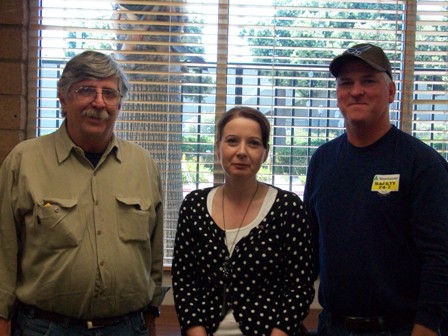 One of my first workplace visits within Southern California was the box making plant in Anaheim that was originally part of the Weyerhaesuer group and is now incorporated into the International Paper Group. On day five of the exchange visit I had the opportunity to visit the Huenema Paper Mill in Oxnard which is also now part of the International Paper Group. TAlison day5he visit had been arranged as Ron Espinoza, International staff representative, was required to attend a stage three grievance meeting on certain members issues including, fair allocation of overtime and bonus payments for members carrying out a certain shift pattern. Whilst informal discussions took place I had an opportunity to tour the paper mill and learn more about the facility at Oxnard. The site predominately supplies other IP sites within California and was the only paper mill situated in this area. Just over 100 employees worked at the site on a 4 X 12hrs shift operation. I rejoined the USW committee during the stage three grievance meeting and the USW representatives, Lee Hawley (President) and Steve Sharp expressed their concerns regarding the issues raised and seeked resolution with the now added involvement of Ron. The issue of fair allocation of overtime is an issue that affects Unite members within the UK and although systems are drawn up to ensure that equal access is maintained, occasionally the procedure fails and this was recognised by the company, The issue regarding bonus payments was to be continued under local negotiations as potential solutions to the particular issue were being sought. Whilst at the meeting, the company also proposed a mobile phone procedure as the unauthorised use of these devises was being more common. Policies regarding the use of mobile phones within the UK are also being introduced by employers as often they are referring to Health & Safety guidelines in limiting/restricting their use. Again, regarding the nature of the grievances raised, I can directly relate to issues that members face within USW in their workplaces.
One of my first workplace visits within Southern California was the box making plant in Anaheim that was originally part of the Weyerhaesuer group and is now incorporated into the International Paper Group. On day five of the exchange visit I had the opportunity to visit the Huenema Paper Mill in Oxnard which is also now part of the International Paper Group. TAlison day5he visit had been arranged as Ron Espinoza, International staff representative, was required to attend a stage three grievance meeting on certain members issues including, fair allocation of overtime and bonus payments for members carrying out a certain shift pattern. Whilst informal discussions took place I had an opportunity to tour the paper mill and learn more about the facility at Oxnard. The site predominately supplies other IP sites within California and was the only paper mill situated in this area. Just over 100 employees worked at the site on a 4 X 12hrs shift operation. I rejoined the USW committee during the stage three grievance meeting and the USW representatives, Lee Hawley (President) and Steve Sharp expressed their concerns regarding the issues raised and seeked resolution with the now added involvement of Ron. The issue of fair allocation of overtime is an issue that affects Unite members within the UK and although systems are drawn up to ensure that equal access is maintained, occasionally the procedure fails and this was recognised by the company, The issue regarding bonus payments was to be continued under local negotiations as potential solutions to the particular issue were being sought. Whilst at the meeting, the company also proposed a mobile phone procedure as the unauthorised use of these devises was being more common. Policies regarding the use of mobile phones within the UK are also being introduced by employers as often they are referring to Health & Safety guidelines in limiting/restricting their use. Again, regarding the nature of the grievances raised, I can directly relate to issues that members face within USW in their workplaces.
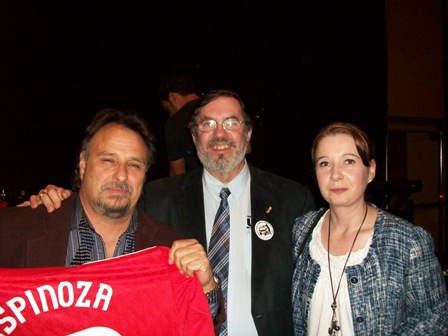 I was extremely privileged to attend the 2010 UCLA Labour Centre Banquet with USW colleagues on Thursday evening when Leo Gerard, President of the United Steelworkers, was being honoured along side colleagues from the California Labour Federation and the California State Assembly. Before Leo took to the stage, Kevin, an activists from the Rio Tinto strike spoke passionately about their situation and the fact that the company had kept them locked out since January regarding disputes on contractual issues. He praised the international support that he received and reemphasised the need for global solidarity. He explained that after months-long lockout at Rio Tinto Borax's southern California operations, members have ended the impasse that began in January. 75% of 570 locked-out miners voted on Saturday to approve a six-year contract between the International Longshore and Warehouse Union and Rio Tinto Borax ending a lockout that began on January 31st.. Kevin a USW activist said, " we as a labour movement need to stand up against these corporate pigs"
I was extremely privileged to attend the 2010 UCLA Labour Centre Banquet with USW colleagues on Thursday evening when Leo Gerard, President of the United Steelworkers, was being honoured along side colleagues from the California Labour Federation and the California State Assembly. Before Leo took to the stage, Kevin, an activists from the Rio Tinto strike spoke passionately about their situation and the fact that the company had kept them locked out since January regarding disputes on contractual issues. He praised the international support that he received and reemphasised the need for global solidarity. He explained that after months-long lockout at Rio Tinto Borax's southern California operations, members have ended the impasse that began in January. 75% of 570 locked-out miners voted on Saturday to approve a six-year contract between the International Longshore and Warehouse Union and Rio Tinto Borax ending a lockout that began on January 31st.. Kevin a USW activist said, " we as a labour movement need to stand up against these corporate pigs"
After moving and inspirational speeches from various delegates directly involved in the struggle for equality and labour rights, Leo Gerard was honoured by the ULC for his huge contribution to the union movement. He received his honour from the car washing community that had been inspired to look towards the trade union movement as they had experienced Leo speaking at various events. These workers were predominately migrant workers and even Leo admitted that he had underestimated the level of exploitation that they suffered as they were for example being disciplined for lack of personal protection. Leo told these workers that they would receive support from the USW and its many members as he could not accept "that human beings for profit will exploit other human beings".
Wednesday 19 May 2010
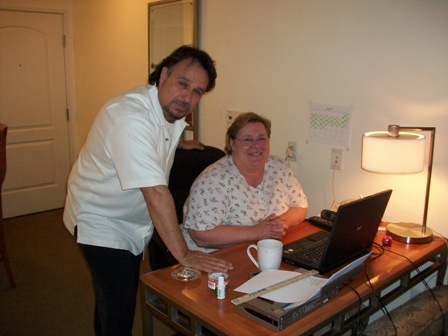 Following the meeting on 18th May, I reconvened with the USW negotiating team to continue discussions at Timec. The company and the union had scheduled three days to meet regarding the current contract and various proposed amendments by both sides however as this was day two we moved to the issue of medical insurance and specifically the proposed Health & Welfare plan put forward by the company. Exchanges on the seniority bonus the previous day had been frank between both parties and although this still remained an important issue to the union, the provision and benefits of medical insurance to union members is extremely key to the acceptance of any contract. Unlike in the UK were private health coverage is seen as a rare benefit due to access for all to the National Health Service (NHS), the provision of any agreement needs to be negotiated via the contract as it can determine the eligibility of many USW members and the benefit coverage they receive.day 4 The USW committee and the Local International Representative Ron asked many questions regarding the access to medical services in the UK and how this could potentially impact on my union negotiations. Although accepting that our health service provisions are not perfect, I explained the essential nature of the NHS and how it had dramatically improved under a Labour Government. I recognised the challenges that USW members now face in attempting to secure the best package for their members especially whilst the company is stating that certain previous benefits are now under review due to difficult economic factors within the sector. Negotiations on these issues would continue on Thursday 29th May however as I was due to attend meetings at another company I would not be present to continue discussions, Thankfully I would receive an update from their President, Bernie Hostein and I also exchanged contact details with their representatives and shared the purpose behind the Agreement to create Workers Uniting, the Global Union.
Following the meeting on 18th May, I reconvened with the USW negotiating team to continue discussions at Timec. The company and the union had scheduled three days to meet regarding the current contract and various proposed amendments by both sides however as this was day two we moved to the issue of medical insurance and specifically the proposed Health & Welfare plan put forward by the company. Exchanges on the seniority bonus the previous day had been frank between both parties and although this still remained an important issue to the union, the provision and benefits of medical insurance to union members is extremely key to the acceptance of any contract. Unlike in the UK were private health coverage is seen as a rare benefit due to access for all to the National Health Service (NHS), the provision of any agreement needs to be negotiated via the contract as it can determine the eligibility of many USW members and the benefit coverage they receive.day 4 The USW committee and the Local International Representative Ron asked many questions regarding the access to medical services in the UK and how this could potentially impact on my union negotiations. Although accepting that our health service provisions are not perfect, I explained the essential nature of the NHS and how it had dramatically improved under a Labour Government. I recognised the challenges that USW members now face in attempting to secure the best package for their members especially whilst the company is stating that certain previous benefits are now under review due to difficult economic factors within the sector. Negotiations on these issues would continue on Thursday 29th May however as I was due to attend meetings at another company I would not be present to continue discussions, Thankfully I would receive an update from their President, Bernie Hostein and I also exchanged contact details with their representatives and shared the purpose behind the Agreement to create Workers Uniting, the Global Union.
After the Timec meeting, I had the opportunity to visit Tina DeMao, Health Care Workers Council Organiser. Tina has been an organiser for six years and we discussed her recent involvement as a Lead Organiser in a Hospital Campaign and strategies specific to Organising within our unions. As I was previously involved primarily in the organising agenda for Unite, I was able to offer Tina an insight into recognition procedures and how it operates in the UK. I also explained how the Unite organising agenda, both on a "Greenfield" or "infill" strategy is seen as central to the unions future. We discussed key differences between USW and Unite campaigns and how they are able to operate within the statutory provisions that are afforded to each country. The process for union recognition in the US has many similarities to the UK yet key differences remain. For example, Tina informed me that it is extremely rare to secure a voluntarily agreement even though if asked, they could easily prove the density of union membership. We discussed that the USW still can operate a closed shop if it becomes a condition of employment as determine by the contract that is negotiated post recognition. I explained how this right had been removed and expressed a wish to see this right reinstated under our trade union legislation. We also discussed the differences between employees that although form part of a bargaining unit, chose for some unknown reason not to join their union and how each system in Unite and the USW can treat them. Picking the best sections of each procedure, I would welcome the closed shop or at least the “fair share” scheme, yet Tina said, “ we are trying to get law passed called the free choice card...this would mean that we get automatic union recognition with union cards that meet the 50 plus1 threshold."
Tuesday 18 May 2010
 I was invited to take part in negotiations that have been ongoing with the USW committee and Timec, Transfield Services Group. Timec is listed as the leading provider of asset management, maintenance, turnaround and small project services to the refinery, oil & gas, mining, mineral processing, petrochemical and food industries. alison day3It was established in California in 1971 and additional offices including Texas were opened in the 1990's. The USW committee is made up of representatives from various Timec sites and Bernie Hostein who is the President of the 1945 Local. I joined the committee, along with Ron Espinoza, to continue negotiations on their current union contract. Although many issues from the union and management side had been tabled and discussed, in this meeting we focused on the company's proposal to amend the current seniority bonus scheme. The USW's approach was to secure protection on the current contractual aspects that rewarded long service employees, whilst seeking improvements that would offer benefits to additional employees and members of the union. Due to differences between the company's and the unions position, negotiations on this issue, and other items, are due to continue the following day. During the adjournments in the meeting, I had the opportunity to speak at length to the USW representatives and we discussed common problems that our members face in the workplace and legislative differences between our two country's. Again it was obvious that workers concerns are global concerns and that we need face to face exchanges between Unite & USW to enable us to effectively share information and ideas.
I was invited to take part in negotiations that have been ongoing with the USW committee and Timec, Transfield Services Group. Timec is listed as the leading provider of asset management, maintenance, turnaround and small project services to the refinery, oil & gas, mining, mineral processing, petrochemical and food industries. alison day3It was established in California in 1971 and additional offices including Texas were opened in the 1990's. The USW committee is made up of representatives from various Timec sites and Bernie Hostein who is the President of the 1945 Local. I joined the committee, along with Ron Espinoza, to continue negotiations on their current union contract. Although many issues from the union and management side had been tabled and discussed, in this meeting we focused on the company's proposal to amend the current seniority bonus scheme. The USW's approach was to secure protection on the current contractual aspects that rewarded long service employees, whilst seeking improvements that would offer benefits to additional employees and members of the union. Due to differences between the company's and the unions position, negotiations on this issue, and other items, are due to continue the following day. During the adjournments in the meeting, I had the opportunity to speak at length to the USW representatives and we discussed common problems that our members face in the workplace and legislative differences between our two country's. Again it was obvious that workers concerns are global concerns and that we need face to face exchanges between Unite & USW to enable us to effectively share information and ideas.
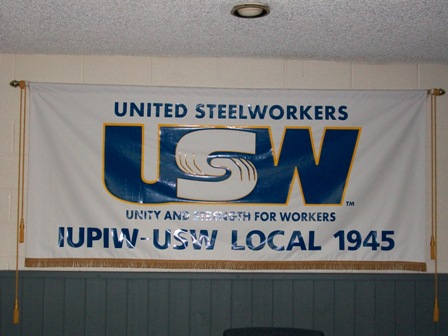 Before I attended the Timec meeting, my host Ron Espinoza, took the opportunity to show me alison day3his office and to introduce me to his colleagues; Lionel Camara and Terry Sims. We chatted about our current work as union officials and how our respective union operates. I explained that I was currently engaged with my Unite representatives in a number of wage negotiations at various workplaces as it is traditionally the anniversary date for pay increases in my company's. My USW colleagues spoke of contract negotiations and how this was not dependant on a particular month but when the contract end for each workplace is due to expire. We also discussed the right to be represented and how this had been formalised in the US as the "Weingarten Rights". The union gives out a card that can be easily carried by every union member that states exactly what the Weingarten rights are and asks that the member reads this to their manager if they are ever asked to attend a meeting unaccompanied. This card also contains space for valuable contact numbers for the member and I believe it could be a beneficial guide for Unite members.
Before I attended the Timec meeting, my host Ron Espinoza, took the opportunity to show me alison day3his office and to introduce me to his colleagues; Lionel Camara and Terry Sims. We chatted about our current work as union officials and how our respective union operates. I explained that I was currently engaged with my Unite representatives in a number of wage negotiations at various workplaces as it is traditionally the anniversary date for pay increases in my company's. My USW colleagues spoke of contract negotiations and how this was not dependant on a particular month but when the contract end for each workplace is due to expire. We also discussed the right to be represented and how this had been formalised in the US as the "Weingarten Rights". The union gives out a card that can be easily carried by every union member that states exactly what the Weingarten rights are and asks that the member reads this to their manager if they are ever asked to attend a meeting unaccompanied. This card also contains space for valuable contact numbers for the member and I believe it could be a beneficial guide for Unite members.
Monday 17 May 2010
The Anaheim Container Plant is part of the International Paper Group and is one of the many sites that operate within the state of California, It predominately manufactures boxes for the agriculture sector and employs over 100 workers on a 24hr day operation with its peak production reaching 24hr per 6 days a week during the summer periods. The local 810 union branch of USW, along with their union official Ron Espinoza, had a meeting with local management planned for 17th May and I was privileged to have an invitation to join this meeting as part of the Workers Uniting programme.
I had previously met with the five strong USW committee the previous day to prepare for this meeting as we discussed local issues concerning members interests such as ; the company's attendance management policy and outstanding grievances. I was grateful that the local management of the Anaheim plant accommodated my involvement in the meting and allowed me to take part in discussions with the USW committee and their local representative Ron Espinoza. The meeting was extremely typical of similar discussions that take place within Unite workplaces in the UK however important statutory and legal differences were prevalent including differences in lay off clauses, disability status and rates of pay. Commonly, the USW representatives had access to a stage three grievance meeting to try and resolve these issues however as a new General Manager was due to take position in June it was wise to hold certain issues until a manager of a senior level can be involved. It was extremely interesting to listen to the debate and learn valuable information regarding certain labour laws that operate within the US. Additionally the representatives raised issues concerning their union facility time and this can certainty be a shared problem amongst representatives within Unite. Shig Noguchi, President of the Local Branch, said " We appreciate the exchange program, it appears our Union’s share a lot of similarity on issues, grievances, resolutions, and quality of people. There is a lot of potential this relationship has in dealing with companies and governments for the benefit on our membership."
After the meeting the company allowed me to tour the site as Steve Moore, Continuity Improvement management facilitated this visit.
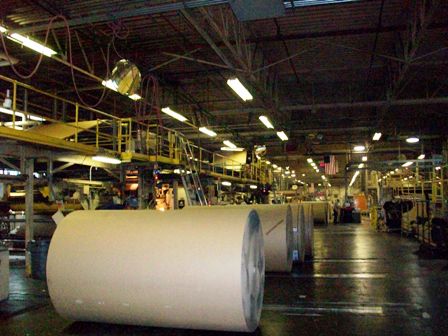
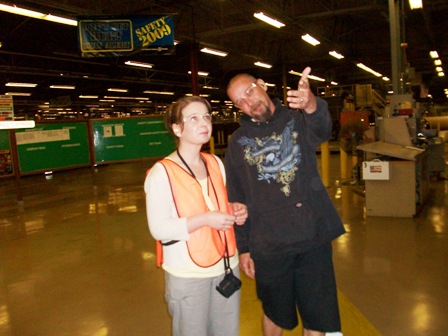 Sunday 16 May 2010
Sunday 16 May 2010
International Paper (IP) is the largest pulp & paper company in the world employing approximately 51,500 employees. As the global leader within this sector it has paper and packaging manufacturing operations in North America, Europe, Latin America, Asia and North Africa. Its site in California, Anaheim, was acquired by IP in 2008 from the Weyerhaeuser packaging sale. Weyerhaeuser traditionally conducted collective bargaining on a site by site basis however IP's approach is to have a centralised, common view on union negotiations therefore the Anaheim site was incorporated into the IP and USW agreement in March 2010.
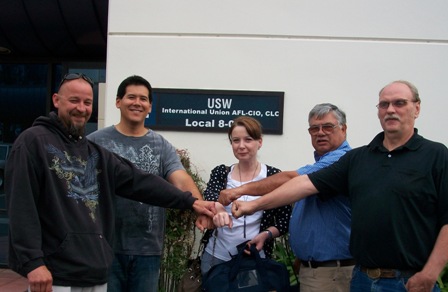 I was invited to join the workplace union representatives on Sunday 16th May, along with their USW local representative, Ron Espinoza, to prepare for a meeting with the company scheduled for the following day. On the agenda were many issues including a wide discussion on the company's attendance policy and outstanding grievances that had been raised by the representatives but not fully resolved. The grievances involved concerns on manning levels, overtime policies, the use of CCTV's and rates of pay.
I was invited to join the workplace union representatives on Sunday 16th May, along with their USW local representative, Ron Espinoza, to prepare for a meeting with the company scheduled for the following day. On the agenda were many issues including a wide discussion on the company's attendance policy and outstanding grievances that had been raised by the representatives but not fully resolved. The grievances involved concerns on manning levels, overtime policies, the use of CCTV's and rates of pay.
Through out the discussions, it was evident that the same issues facing members here at IP Anaheim, are also being raised by members of Unite in their respective workplaces. Randy said "it was very interesting to know that we all face similar issues and struggles....it would be great to keep doing this type of exchange."
As we discussed strategies to deal with these issues it was evident that representatives from Unite & USW need to develop close working relationships and extend discussions to cross borders. Developments and decisions taken by multi- national company's are happening at international level therefore we should also ensure we have a forum to share information and ideas.
The USW committee is made up of Roger, Randy, Dennis and Shig who is the President of the Local
Tim Elliot - Wisconsin
Friday 21 May 2010
Today Sally Feistel (Sub-District Director) of USW and myself travelled to Kimberly-Clark in Marinette Wisconsin to attend another follow up meeting with the K/Cark management to discuss the Labour negotiations for the members of the USW.
During one of the breaks I had the opportunity to talk to the Rapid Response Rep from the local (chapel) who spent some time explaining to me what Rapid Response meant! Rapid Response is a way the union communicates to its members through e-mail to the rep who then produces leaflets etc and distributes these to the members informing them on what Senator to phone, or who to lobby, also ideas on what they union can use and ways of informing members on what the union is doing.
Thursday 20 May 2010
Today I attended the Arbitration meeting with Paul Footit (Staff Rep for the Steelworkers Union) following the pre meeting on the 19th June concerning the Steelworkers Union members, who work at the Alliance Laundry Systems factory in Wisconsin.
The Arbitration meeting costs $1350 with the Local union (Chapel) paying half plus the lost time for 7 members over 2 days.Tim day 4
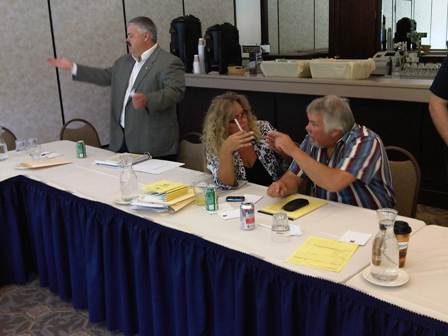 The meeting started at 9.00am and at 9.10am the Arbitrator asked both sides did they want one more go at coming to some agreement outside of the room, to which both sides agreed. Four hours later both sides come to a agreement on most issues. This led to the union receiving $1,415 in back pay for its members and agreement that changes to job descriptions will only be agreed upon by both sides and attitude will not be used as a criteria in a job description evaluating for pay step increases.
The meeting started at 9.00am and at 9.10am the Arbitrator asked both sides did they want one more go at coming to some agreement outside of the room, to which both sides agreed. Four hours later both sides come to a agreement on most issues. This led to the union receiving $1,415 in back pay for its members and agreement that changes to job descriptions will only be agreed upon by both sides and attitude will not be used as a criteria in a job description evaluating for pay step increases.
Following the Arbitration I attended an Alliance members meeting where I talked about the British Airways dispute and Workers Unite.
Wednesday 19 May 2010
I attended a preparation meeting for a arbitration with the Steelworkers officer Paul Footit today, along with the reps who are also going to attend the meeting tomorrow.
It appears that arbitration meetings are the equivalent of our Tribunal meetings, but what is different to our Tribunals is that the officer defends the union member at the arbitration. This obviously takes up a lot of the officers time.
This company in question employs some 1,000 people and makes washing machines. It would seem that one of the union members has not been offered a position he should have got in 2007, it has taken all this time to arrange the meeting on the 20/5/10.
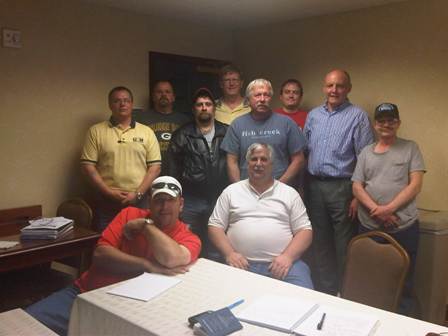 We then travelled to Menasha to a company called Intertape Polymer who employ 152 people who make paper tapes and print on some of them. The workforce (called the Local) had reached a third step ( which means they havetim day 3 put the issue into procedure with the union) concerning a manning issue on one of the machines, where in the winter period some of the workforce could not get to work because of the bad weather.
We then travelled to Menasha to a company called Intertape Polymer who employ 152 people who make paper tapes and print on some of them. The workforce (called the Local) had reached a third step ( which means they havetim day 3 put the issue into procedure with the union) concerning a manning issue on one of the machines, where in the winter period some of the workforce could not get to work because of the bad weather.
Tuesday 18 May 2010
Today I attended a meeting with Sally Feistel Union Officer of the United SteelWorkers Union and the local reps, with the management of the Marinette site of Kimberly-Clark in Wisconsin USA.
Kimberly Clark own around 11 factories in the USA of which 6 are fully unionised. The mill makes Paper Towels and Cartons and employs just over 250 people who are all in the union other than the supervisors and management who are not allowed to be members.
Most of the work force work 2,496 hours a year, unlike the people in factories in the UK who work 740 hours less.
At the meeting the company were trying to get our reps to agree on a 5 year deal of 2.5% per year, reduce earnings in certain departments, cut pensions, and introduce many other cuts.
All Chapels receive 44 cents per person back from the union subs which helps to pay for local officers payments as well as other expenses for the members.Tim Elliot - Wisconsin
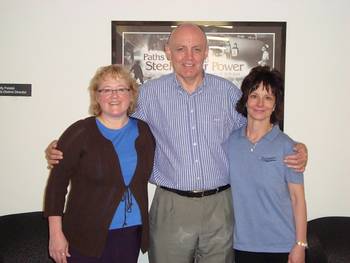 Monday 17 May 2010
Monday 17 May 2010
I was picked up by Sally Feistel at 6am and taken to one of her Paper mills called New Page, which was a two hour drive from the hotel. At this meeting were some 12 reps from various departments from all over this huge Paper Mill that used to be owned by Storaenso some years ago, along with 3 of the management team.
The meeting was arranged to review our members terms and conditions also looking at manning issues etc.
What was interesting was that our members at the above mill worked 6 days (48 hours a week) with the next day off, throughout the year on a treble shift basis. This meant that the people were earning high basics but with very little time off.
Sally then took me to her office to meet the staff and explain to me what her job role is within the United Steelworkers Union.
Louisa Bull- British Columbia
Friday 21 May 2010
Friday morning and Brian and I head out to Annalis Island to meet the members at CIPA Lumber Co Ltd. This mill has recently dropped out of the Forestry national agreement and so the USW reps are keen to keep any local deal for 2010 in line with the rest of the industry going forward.
CIPA local rep Bob explains that the two morning workplace meetings have been scheduled for the night shift as they were finishing and the day shift prior to their 7am start time. Along with the shift changeover meeting Bob had also arranged for Brian and me to return to address the afternoon shift at 3pm ensuring that all 100 USW members had been met. The turnout today was good as many of the members have issues that they wish to be included in the bargaining for 2010. There is a lot of concern over the current health care plan as the company had moved its package recently and many of the USW members and families have been hit hard over medicine costs. Along with long term disability cover these matters come high on the bargaining agenda. Bargaining over pay is set to commence at CIPA over the next few weeks and whilst the members are seeking a substantial pay deal they have already been notified about the concessions the company will be demanding in the negotiations.last day
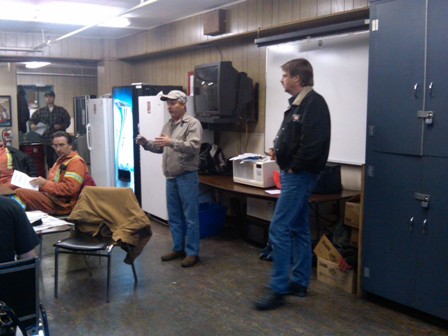 After CIPA we travelled the 70 odd miles up to the town of Hope. Based at the eastern end of both the lower mainland region and the Fraser Valley, Hope sits in the coastal mountain range. The journey up to Hope is not a daily occurrence for the officers in Local 2009 but as the employer was today sharing bad news with our members it was an appropriate day to visit. The USW members employed by the facilities company Sodexho are currently based in the Hospital at Hope that is run by Fraser Valley Healthcare. The Health Care Company has in its portfolio several sites and had put the whole contract out to tender. Sodexho had failed to retain the Hope contract and their HR team were on site to issue the redundancy consultation notice to our members. Unlike the UK, our members in BC are not afforded the protections we have under the TUPE legislation so once the contract was lost to Sodexho there jobs were terminated. This is bad news at any time but on a bank holiday weekend and with no prior warning it was a shock to the women we met up in Hope and a very distressing meeting took place. What I found most difficult to accept was that under the BC legislation there is no duty on either Sodexho as the employer, or Fraser Healthcare as the client, to find alternative work or to compensate our members in any way.
After CIPA we travelled the 70 odd miles up to the town of Hope. Based at the eastern end of both the lower mainland region and the Fraser Valley, Hope sits in the coastal mountain range. The journey up to Hope is not a daily occurrence for the officers in Local 2009 but as the employer was today sharing bad news with our members it was an appropriate day to visit. The USW members employed by the facilities company Sodexho are currently based in the Hospital at Hope that is run by Fraser Valley Healthcare. The Health Care Company has in its portfolio several sites and had put the whole contract out to tender. Sodexho had failed to retain the Hope contract and their HR team were on site to issue the redundancy consultation notice to our members. Unlike the UK, our members in BC are not afforded the protections we have under the TUPE legislation so once the contract was lost to Sodexho there jobs were terminated. This is bad news at any time but on a bank holiday weekend and with no prior warning it was a shock to the women we met up in Hope and a very distressing meeting took place. What I found most difficult to accept was that under the BC legislation there is no duty on either Sodexho as the employer, or Fraser Healthcare as the client, to find alternative work or to compensate our members in any way.
Being my last day working with the USW it reminded me that whilst BC has some excellent trade union rights such as the closed shop, right to bargain and the right to strike there are still many areas where our rights here in the UK can still compete and this type of exchange between our two unions helps to capture the differences.
Thursday 20 May 2010
Flying out by sea plane from Langley airport to Vancouver Island on Thursday morning I once again met up with Scott Lunny. This time we were heading for Victoria the capital of BC and home to the Legislative Assembly. Scott is very much involved in the political work of the USW and not only represents District 3 but is also a Vice President of the New Democratic Party of BC (NDP). With 85 seats in the house and the Liberal party in government with 49 members the NDPs 35 members are up in the polls and already preparing for the 2013 May election.Louisa day5
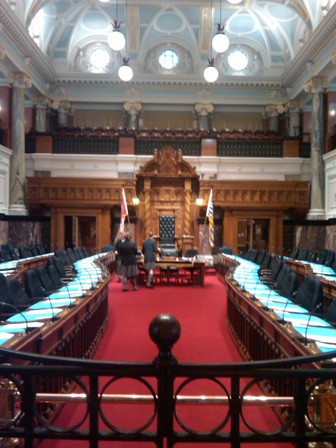 Scot and I were both guests of NDP member Harry Bains who not only invited us to lunch in the house but as the Member of the Legislative House for Surrey-Newton he introduced to the Assembly from the floor of the house. Harry was also joined at lunch by two other MLAs from the NDP, Raj Chouchan and Bill Routley. All three f the guys were former Steel workers and so over lunch we discussed the work of the USW in the house and I had the opportunity to answer many questions on the political situation we are now facing in the UK.
Scot and I were both guests of NDP member Harry Bains who not only invited us to lunch in the house but as the Member of the Legislative House for Surrey-Newton he introduced to the Assembly from the floor of the house. Harry was also joined at lunch by two other MLAs from the NDP, Raj Chouchan and Bill Routley. All three f the guys were former Steel workers and so over lunch we discussed the work of the USW in the house and I had the opportunity to answer many questions on the political situation we are now facing in the UK.
As well as meeting members of the MLA, Scott and I had come to Victoria to attend the monthly meeting of the NDP Labour group. Very similar to the TULO executive in the UK, it is made up of the Presidents of the affiliated unions in BC. The Labour group are currently working with the NDP on their strategic plan to “form Government in May 2013”. With the arrival of NDP leader Carol James and her Chief of Staff Jim Rutkowski, we settled into an afternoon’s discussion on the main issues that were to be the foundation stones of this three year campaign. The NDP have until May 2013 to win over the electorate and unions like the USW are key to turning this into a reality.
As many of the union officers were heading back to the harbour after the meting, to wait for the seaplane home, they took the opportunity once again to talk about the UK political situation and were keen to hear more about our recent experiences with the Unite4Labour strategy.
Wednesday 19 May 2010
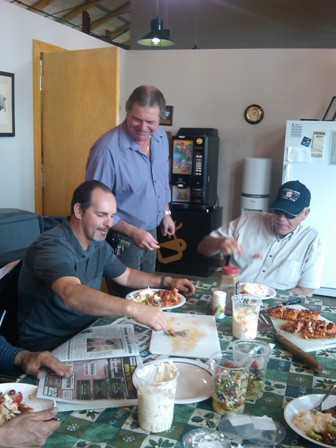 Robar Industries Ltd, who design and manufacture a wide variety of cast and fabricated fittings for municipla distributionof water and sewer alongside their casting and forging manufacturing division, in the Surrey district was the first meeting of the day. Accompanying Les Veale from Local 2009 and staff rep Earl Graham we met up with our local stewards Dan and Robert for a quick pre meeting. Louisa day4The Robar full committee had been present at a planning meeting in the offices of Local 2009, over the weekend and Earl had been busy since then preparing a document to table with the employers.Robar’s bargaining contract had ended in late 2009 but due to the economic climate bargaining had been delayed until now. Company President Jacqueline Levy was accompanied by two executives Roy and Derek and they were as keen as their leader to tell us how tough it was in the market and how difficult it would be to bargain. Earl led our team and once our demands had been tabled the management had to cost it all out and sought an adjournment. Negotiating this contract was going to take some time as the aspirations of the members on site are quite high.
Robar Industries Ltd, who design and manufacture a wide variety of cast and fabricated fittings for municipla distributionof water and sewer alongside their casting and forging manufacturing division, in the Surrey district was the first meeting of the day. Accompanying Les Veale from Local 2009 and staff rep Earl Graham we met up with our local stewards Dan and Robert for a quick pre meeting. Louisa day4The Robar full committee had been present at a planning meeting in the offices of Local 2009, over the weekend and Earl had been busy since then preparing a document to table with the employers.Robar’s bargaining contract had ended in late 2009 but due to the economic climate bargaining had been delayed until now. Company President Jacqueline Levy was accompanied by two executives Roy and Derek and they were as keen as their leader to tell us how tough it was in the market and how difficult it would be to bargain. Earl led our team and once our demands had been tabled the management had to cost it all out and sought an adjournment. Negotiating this contract was going to take some time as the aspirations of the members on site are quite high.
Not every day are you treated to an office barbecue of fresh salmon for lunch but today staff rep Steve Dewell had headed out early to provide just that for the officer team and staff based in the Local. It was a nice treat on a busy day and gave me a chance to get to know the guys and discuss their workload a bit more.
Brian had set up the afternoon for me to go back to Surrey to Mackenzie sawmill. One of the older more specialised mills it has been working since the early 1940s and employs around 110 of the USW members. Unlike our paper mills Mackenzie has to rely on the operative for the cutting and selecting of size and grade, so whilst this plant is automated when it comes to sorting and packing the wood the other parts of the process relies on highly skilled USW members that have worked here a long time. Like the UK paper industry the Union is battling to persuade the employers to put in succession plans and training programmes to ensure these mills have a workforce for tomorrow. Our plant chairman Charlie, was busy on shift but had time to say hello whilst I was there.
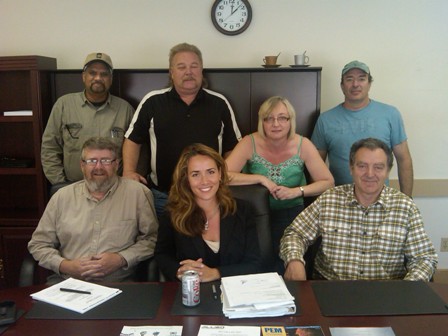 Late afternoon Brian and I head out of Langley to the Abbotsford District Teachers’ Association office, where Brian is the President of the Fraser Valley Labour Council. I sit in on their executive board meeting over dinner and the delegates show up for 7pm. louisia day4 bThe unions affiliated to the Labour Council meet every month and have a full yearly calendar of meetings, fund raisers and social events around both the industrial and political agenda. This months guest speakers included John Visers who was lobbying for union support for the “Zero Waste B C” campaign to get the province to stop burning waste and to put in proper waste management programme. The Labour council is affiliated to the BC, NDP and in his role as party VP Scott Lunny was back to spell out the Strategic Plan to get the party back into government. Along with campaign organiser Korleen Carreras they were also looking for campaign volunteers to canvass for the party and sign up to party membership. There was also an update from executive member Tamara on the BC pension campaign and an opportunity for me to address the delegates and explain how things work for trade unions in the UK before the night was over.
Late afternoon Brian and I head out of Langley to the Abbotsford District Teachers’ Association office, where Brian is the President of the Fraser Valley Labour Council. I sit in on their executive board meeting over dinner and the delegates show up for 7pm. louisia day4 bThe unions affiliated to the Labour Council meet every month and have a full yearly calendar of meetings, fund raisers and social events around both the industrial and political agenda. This months guest speakers included John Visers who was lobbying for union support for the “Zero Waste B C” campaign to get the province to stop burning waste and to put in proper waste management programme. The Labour council is affiliated to the BC, NDP and in his role as party VP Scott Lunny was back to spell out the Strategic Plan to get the party back into government. Along with campaign organiser Korleen Carreras they were also looking for campaign volunteers to canvass for the party and sign up to party membership. There was also an update from executive member Tamara on the BC pension campaign and an opportunity for me to address the delegates and explain how things work for trade unions in the UK before the night was over.
Tuesday 18 May 2010
On Tuesday morning I headed downtown into Vancouver with Les Veale an officer from Local 2009 and staff rep Steve Dewell from the International. The Labour Board here in BC is very much a hybrid of both the ACAS process and the Employment Tribunal in the UK, and today we were heading into informal talks with one of the more hostile Saw Mills in the Province. This meeting was being facilitated by Wayne Mullins, special investigating officer from the Labour Relations Board and it kicked off with both sides in a face to face meeting. Whilst this case has been going on for a long time there was not much expectation on our part of an early settlement today and once our legal team had opened up, this proved to be the case.
I took advantage of the adjournments in this session to get a short briefing on Canadian employment law from the USWs' barrister Sebastien Anderson. Whilst the origins of the legislation can be traced back to the UK much has been changed and improved over time. We may have statutory recognition in the UK but here in BC this is strengthened by the right to seek arbitration to gain a collective agreement and the positive right to strike if all else fails.
In this case however the USW were making a claim for recognition of the Saw Mill based on the argument of a common employer, and this continues to be contested by the company’s spokesperson. Alongside this was the USWs initial claim for back dues. With a full hearing scheduled for June 2010 this case may still have some further twists and turns in it before it is settled.
With the Labour Board over early I managed to meet up with Don White another officer within Local 2009 who was heading off to one of the residential care homes in the area. Don was meeting the membership to finalise a ballot for the workers on site employed by the facilities management company Sodexho. Patricia Gaudette who works in the food service department has been the workplace rep here for three years and had organised a workplace meeting for Don and I to talk to the members prior to the vote. She explained to me that she had worked on site for two years with no union when she first decided to organise her co-workers and secure recognition for the USW.
Patricia and Don had recently concluded negotiations with Sodexho on a new contract that would guarantee six monthly increases in the hourly rate for the workforce until 2012, additional sick days and a commitment to pay the individual holiday bonus in the year it was due. To date Sodexho had not been very prompt to pay up which for workers on this site meant a delay in earnings that was between 3% and 6% of gross income.
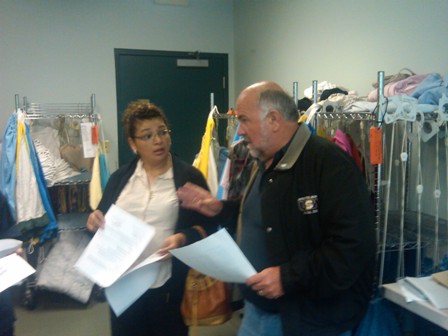 The members here are some of the lowest paid workers within the USW’s membership and are constantly squeezed between an employer seeking to make a profit and the Client, when it comes to securing improvements in their terms and conditions. Don took the members through the offer, answered their questions and then the ballot box was opened up for voting. With a unanimous vote in favour of the offer secured, the meeting wrapped up and we headed back to Langley.
The members here are some of the lowest paid workers within the USW’s membership and are constantly squeezed between an employer seeking to make a profit and the Client, when it comes to securing improvements in their terms and conditions. Don took the members through the offer, answered their questions and then the ballot box was opened up for voting. With a unanimous vote in favour of the offer secured, the meeting wrapped up and we headed back to Langley.
Monday 17 May 2010
Monday morning in Local 2009, President Manjit Sidhu is out of town and the officers meeting is chaired by 1st Vice president Scott Ritchie. All officers and staff reps show up and give an update on their bargaining, organising, grievances and arbitrations that have either concluded in the past week or are part of the workload facing them this week. I was asked to report on my work for the week prior to my visit and share ideas with the officers. Whilst there seems to be a whole host of TUPE cases in BC, the legislation here is very different and the protections we have under this type of legislation do not exist for our members in this Province. Whilst much of the employment law here is different campaigning and day to day representation is similar, although officers in Canada do not do individual representation cases where collective bargaining does not exist in the plant and this proved to be quite a point of discussion.
Staff rep Steve Dewell has been asked by the International to work with the NDP party for six weeks in phase one of their strategy of returning a NDP government. I sat in on the meeting with him and the local constituency party leaders to map out their campaign. I was able to give some insight to the work we had recently done in the key seat of Hammersmith, London which returned a Labour MP and it once again underpinned the value of my visit.
In the afternoon I went out with Brian to the District Office to meet with Napoleon Gomez, General Secretary of the Mexican mineworkers Los Mineros. Napoleon told me about his exile from Mexico and the imprisonment of one of his national officers Juan Linares. The Mexican government and the major mining corporations have been in dispute with the union since 2004 and the USW has pledged it continued support and solidarity not just for the striking miners and their families but to ensure that Napoleon is able to run his union and keep himself and his family safe in Canada. Meeting Napoleon was a unique privilege and has left me with a renewed commitment to our work as trade unionists.
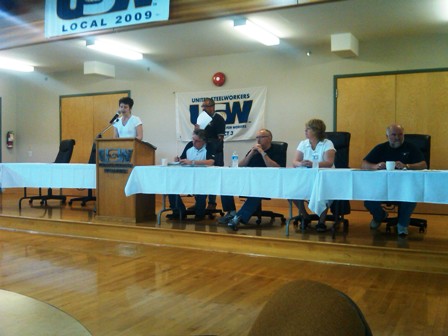 Sunday 16 May 2010
Sunday 16 May 2010
Flying in to Vancouver, BC on Friday evening to work with the United Steel Workers Union in District 3, was an exciting moment for me. Based out of their Langley office I am working with one of the International staff reps Brian Harder.
Brian whilst a member of the national team, has an office in Local 2009 and I was a guest on Saturday morning at their Executive Board meeting, or Regional Council as we know it. Local 2009 is an amalgamated local, bringing together the traditions and history of both the former SteelWorkers and the International Woodworkers Unions.
It soon became clear from the industrial reports that the day to day work of the workplace reps and regional officer’s here in BC, are the same as in the UK. Whilst we may all head off to the pub after the meeting to discuss the day’s events and make contacts here I am treated to a barbecue lunch in the sunshine and the opportunity to talk to both the local officers and workplace reps.
The local has around 4,000 members across all sectors and it was good to see a very good representation of women at the meeting and meet Ardell the Chair of the Women’s committee. Much of the of the equality work is community based and so is the new initiative here in Langley known as “Steel wheels”, which has seen a group of activist get together and form a motor bikers group. Steel wheels is still new but a growing venture and one to watch!
Vice President Scott Lunny, from District 3 addressed the delegates about the unions campaign with the NDP (Labour Party) on returning a Labour government in 2013 and this was as topical as it gets coming directly in from the UK election.
It may be the first day but it is already clear that Workers’ Uniting has an essential role in today’s global world of work.